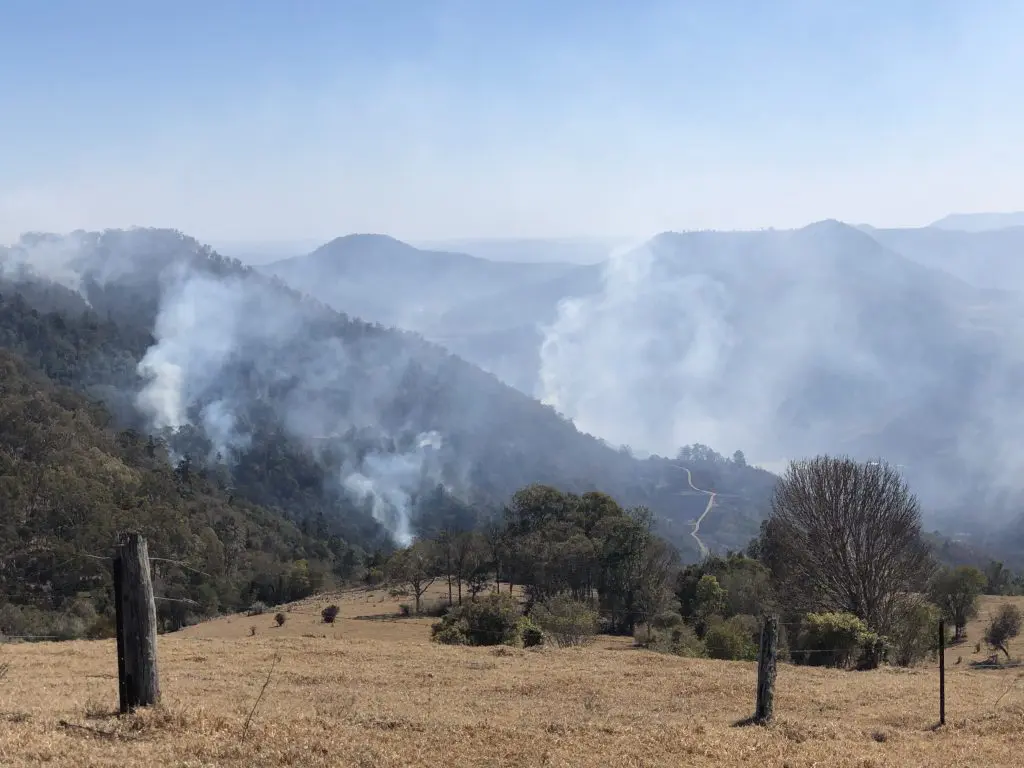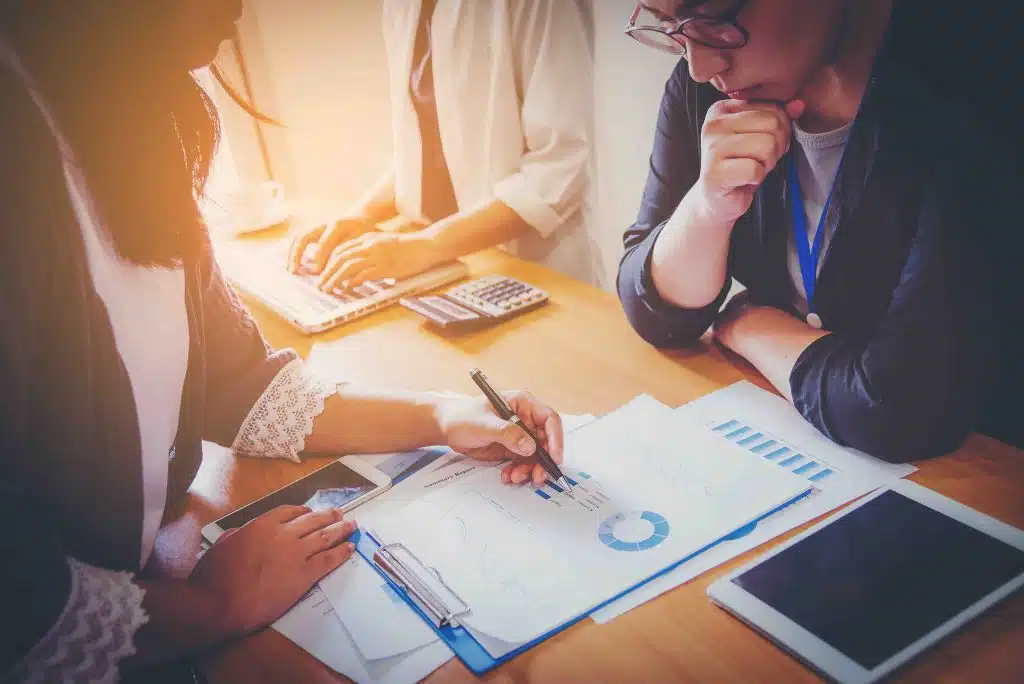Re-inventing Ourselves After the Fire
Four months ago we watched a blaze in the valley opposite our home consume Binna Burra, a historic Icon in a forest that was ‘not meant to burn’. It was 12.30am, and we woke to near 100km per hour winds sensing things weren’t right. The top of the gully was ablaze. The firestorm rushed up the cliff face, moving east with a series of explosions and tragic consequences. We watched for several hours, unsure if we what we were seeing was real, and trying to make sense of the unthinkable. Our once lush rainforest, our big back yard, was burning. What we knew of Binna Burra was gone.
Trapped in the gully that leads down to the river and up to our home, this fire was on the move. Over a week, the slow creeping fire found its way across the river and up towards our property. We took drastic measures, removing our entire garden to eliminate any chance of the fire using plants as transmission to our homes. We removed the fuel from under our house, and we chipped in to help our neighbours do the same, working together to prepare all of our houses for what may come.
We were then evacuated. Asked to leave and allow the emergency services to do their job. Leaving that day, we felt a sense of complete helplessness. We drove away with a boot full of valuables and a sense that this may be the last time we saw our place and these beautiful homes on the ridge.
The fire was at emergency level the next day and the fast moving Rural Fire Service sculpted a fire-break to ensure our properties were defendable. This gouged out more than 3 metres of earth, felling huge trees at our perimeter and offering some gap between the blaze and buildings. We did not ask for the firebreak, but were ever thankful for their fast-thinking response.
We were the lucky ones. Our home was spared.
Now we had a new challenge, landslip. With the ‘wet season’ nigh, we recognised the danger of a 3 metre earth embankment. True, no rain was anticipated for several months, but given that just 3 seasons prior, Cyclone Debbie caused our entire road to slip, and it had just been repaired after three long years of road closures, day and night works, so we needed to move fast.
We did, calling in a professional to retain our land with a 3 metre rock wall to the east and a 3 metre rock wall to the west – a fortress if you like to give ourselves the best chance. Our fire continued to burn until Christmas Eve, when it finally made its way to the firebreak. I have never been so grateful for an investment in landscaping. Whether it was the wall itself or the fact that over the course of 4 months, we’d had so many notifications, evacuations and fires re-igniting or newly erupting, we felt we had done the best we could to protect ourselves and surrendered our fate to the Gods.
This is not just my story. As I draw breath in Sydney in January 2020, I am connected with the story of our nation. For months now, it has been smokey and grey and it reveals for us what we take for granted as a basic human right – clean air. For weeks now, our social media feed has been choked by news of unprecedented and catastrophic blazes in the southern states. Watching these stories, we are connected with a new human, wildlife and ecological story unfolding.
I never thought I’d be grateful for this experience, but it has changed us for the better. It has taken us several months to conclude this, so I’d like to share how we arrived here in the hope that somewhere, someone else who has gone through what we did, can learn to make new sense of what re-inventing post the fires means.
Reflection 1 – Re-define what’s important
A fire helps you do that. It’s immediately clear that possessions fall second to lives and relationships. This happens are many levels. Initially, there were sudden new people that ‘showed up’ and volunteered themselves (risking their lives) to protect us and our home. This incredible feeling of gratitude is hard to describe, so deeply humbling and above all humanising – we were all connected in the face of what was coming.
At first, we were struck by a deep understanding of what it is to be human and in community with others. Not as a choice, but as an instinct for survival. Four months on, we realise that this experience has had us question many of the aspects of our life we take for granted. Where we invest our time and money. Causes we care about. Being a mindful community member. Giving to those that have less than ourselves. The meaning of our work.
This experience and those reflections have changed a number of our conversations and practices and helped us make new choices, clear our clutter (literally), commit to new causes in the world and re-create ourselves in a way that’s aligned with who we want to be in this time of climate discussions and change. We want to be in this discussion as generators of new possibilities around climate, not enraged opposers. There’s more we can do in the mood of courage than the mood of resentment.
Reflection 2 – Don’t try to make sense of it
We refer to the idea that “why did this happen to me?” is an unhelpful question. This kind of question inevitably looks to assign blame or make sense of what sometimes will never make sense. The fact is that we live adjacent to a National Park full of trees. It is a beautiful and pristine place and we have chosen to live here because of that. What happened was unexpected, and I dare say, had never been imagined as a possibility. A more helpful interpretation can be to accept what has happened, even if we don’t like it for the sake of moving on, because to live in resentment of what happened means we create a future of loss and grieving that keeps us stuck and hostile. We choose to move forward in a more constructive mood.
Reflection 3 – Choose a mood that moves you forward
Mood is always a choice. Life rarely happens in the way we ‘think it should’ yet for some reason we set about trying to shape and control our reality so that life conforms to our standards. When we do this, we are setting ourselves up to fail. The story we live in about ourselves and our relationship with ‘what happens’ generates a mood, and moods have the power to either open or close us to possibility.
When the fire first happened, we were in a state of action, soon followed by disbelief and then the frustration of it appearing and re-appearing. We felt helpless to begin and building that wall was one way of ‘going with’ what was happening. We recognised quite quickly that that this may not be a one-off scenario. We are likely to be in a new time of climate and the wall is a way to prepare for the next 10-20 years of risk we face. This is the mood of acceptance. This is the one we used to move on. We accept we are in a new climatic phase, compounded by drought. This is not our doing, but the effect of cumulative changes in our climate. We accept this as likely. In accepting this, we were emboldened to take action and prepare as best we can for this new era. This is a mood that moves us forward – even now. We are not resentful of having to fund our own wall, nor resigned about our fate in the new future. Instead we choose acceptance and courage to be actors on a bigger stage to make a positive contribution to the conversation on climate.
Reflection 4 – Accept we are in a new climate era
We have only received 350mm of rain in a region that generally received 1200mm per annum. Near our property, we are in drought. This requires new thinking and a new response. It means we must re-think water management. It means we must rethink what we plant in our garden. It means that our neighbours are in communication about a shared plan of action and when any one of us is away, we are all vigilant on behalf of the community. It means in our professional space – leadership – that we ignite new conversations where leaders can discuss responses to our emerging climate. It means we question land management practices regionally and nationally and explore new ways in a spirit of curiosity and cooperation. It means we can do this together and we can realise that by acting together, we are more powerful.
Reflection 5 – Harness the power of the village
We have lived in Sydney, Melbourne and Brisbane. We now split our time between SE Queensland and Sydney to attend to our business in the cities, and we consider ourselves a part of many villages. These villages have all kinds of precious attributes. The first is a sense of connection and community. Our village on the ‘mountain’ is a special mix of eclectic souls with a passion for the environment. We are connected philosophically, despite our varied backgrounds. This village showed itself to be powerful when we faced a common enemy – the fire. Now we find ourselves powerful in our conversations and relationships and in a view of what a Fire Management Plan might mean for we rural dwellers.
Our other villages are based on our interests. We have a village we study philosophy with, and this reaches to all parts of the world, especially strong in the USA. We have a village of sustainability practitioners in Australia, particularly strong in Sydney, Melbourne and Adelaide. We have a village of friends and family scattered around the globe. We have a village of customers and clients and they have villages known as organisations. This is our sphere of influence and think about the kinds of conversations we can embark on to draw attention towards a more mindful presence on the human planet. This shifts us away from feeling powerless and small to feeling connected and raising a voice of possibility into spaces that matter.
Reflection 6 – The courage to engage in new kinds of conversations
We could have chosen a quiet life living up in the mountain, growing veggies and living sustainably on our solar system. We have not. We have agreed that there’s more we wish to give, contribute and learn as we transition towards our retirement years. In fact, we don’t really want to ‘retire’ – and this means that we want to be more active participants in our local and regional world. This is a choice anyone can make and it moves us beyond passive citizenship. We need more active citizenship and those Australians speaking up are being more active right now. It’s a worthy space to step into, requiring courage to move beyond resignation and apathy. We are choosing to find a voice in matters of our country and climate.
Reflection 7 – Practice gratitude
It seems ironic that we feel grateful for the fire. We are grateful it happened to us because it woke us up from being apathetic. It brought our neighbours together. It has had us learn more about our flora and fauna. It has made us realise this can happen to any forest – even a wet rainforest! It has made is rethink, declutter, talk more and be more deliberate citizens. Our gratitude is not for physical ‘home’ alone – it’s about the social and spiritual awakenings we have benefitted from.
And for the volunteers and professional firefighters, the dozer drivers, the community. What can you say about them? The heart swelling feeling we feel writing this is far beyond gratitude. We feel like we truly live in the luckiest country!
Reflection 8 – Stop tranquilising yourself!
In times like this it’s easy to turn to something to avoid the pain. True, there was a night where we reached for the bottle of scotch to dull our fear, but this temporary escape was not really a comfort. We talked about this as a couple. Why do we do that and what are we running away from? We realised we were running from feeling. There’s so much happening in this world, it’s easier to reach for a vice, a habit or a place to escape than to be present to the ‘experience’ of that which confronts or upsets us.
We all have something – work, the TV, social media, alcohol – that we escape to in order to avoid experiencing life in her full veracity.
As Australians we have not had an escape these past months. We have faced it every night on the news and every day in our news feeds. And this has woken us up at some level. Whether you agree with the discourse, it’s clear that our citizens are currently more active on issues that matter to them. It is a time for vigilance and choice to be awake and conscious citizens as we tune into the ways we can get involved in what’s happening on our planet and influence the decisions our leaders make on our behalf.
Reflection 9 – Get into action in crafting a life that matters!
We have a second chance. The fire was not for us a near death experience, but for many of those affected, it was. We can never know that experience and our compassion extends to those who suffered in our nation.
You don’t need to have ‘gone through it’ in person to have a sense of renewal. There are simple things we can do as city dwellers to make a difference on climate. Consume less, be mindful of purchases, waste less, use less water, migrate to solar, harvest rain, buy second hand where possible, find a cause you support, find a group you can advocate through. There are hundreds more ideas. These behaviours all matter.
We are choosing to see what happened to us as our second chance. A chance to re-invent ourselves and tweak the direction of our lives for the sake of future generations and the wonderful wildlife and ecology we live alongside. A chance to make a stand where we want to, and to live in a mood of optimism and possibility for impacting our future. A chance to have a smaller ecological footprint and a bigger social impact. This is how we are choosing to emerge from our fire.
This article is dedicated to all of those who have suffered in this time.



